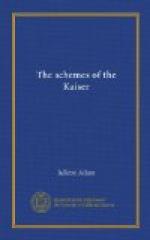When the Imperial traveller shall have exhausted all pretexts for rushing about on this Continent, he will go to Africa. There is a but about this; it arises from the question whether he will be able to obtain from his Ministers that they should ask the Reichstag or the Landtag for the 800,000 francs that he needs for the voyage, the Constitution forbidding the King of Prussia to leave Europe. But what does the Constitution matter to William II? He, the master, will put an end to it!
August 1, 1891. [10]
What are the qualities which have distinguished the Government of Germany since the victories of Moltke? The patient tenacity of William I, and a continuous policy of trickery raised by Bismarck to the level of genius.
William II is a mind diseased, infatuated with itself. His actions are dominated by pride, and all the most childish off-shoots of that weakness, love of noise, of attitudes, of pomps and vanities and jewellery; his mind is a thing of somersaults, and his will is subject to capricious whims and sudden outbursts of temper.
August 11, 1891. [11]
May we not flatter ourselves that the torments of William II are now beginning? He, who only yesterday proclaimed himself to be the triumphant personification of the German Empire, is now compelled to inaction as the result of a fall. Whilst the Great Tzar is received with acclamation on board of the French Marengo, he goes awkwardly stumbling about on the deck of his yacht.
The German Emperor composed for himself a prayer, which he is accustomed to have said in his presence, and in which God is implored “to grant His protection to the Emperor William, to give him health and inspiration for the fulfilment of his mission towards the nations.” To-day, reduced to inactivity by his illness and by the consequences of his folly, he has ample leisure to reflect on the psalm which he is so fond of singing, with the mitre of the summus episcopus on his head: “The kings of the earth are the instruments of God.”
Yes, Sire, they are instruments which God breaks as easily as He bends a reed before the wind. He is pleased to humble the proud, and He reserves defeat and death as the portion of the parricide.
August 29, 1891. [12]
Germany’s luck is running out. . . .
The Emperor certainly lacks neither the youth nor the audacity to compel fortune, but he drives her too hard, and ignores all her warnings. His fall is a clear warning, which he appears to be quite unwilling to notice; more mechanical than ever in his movements, he is now taking to riding again. By his orders, his illness and even his fall are alike contradicted. His reason for withdrawing himself so long from the gaze of his adoring subjects is to let his beard grow, after the fashion of Boulanger. But he hasn’t wasted his time; his furious impatience under activity has brought about a fresh attack.




